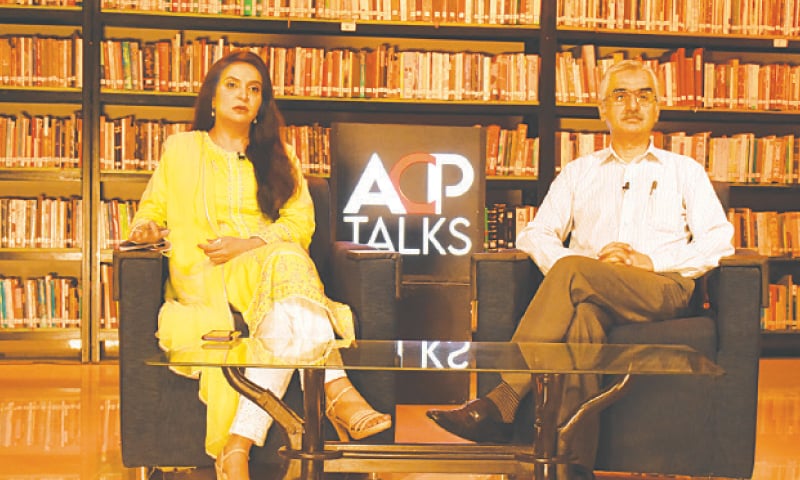KARACHI: The Arts Council of Pakistan Karachi on Tuesday evening held in its Josh Malihabadi Library an event to pay tribute to the renowned Indian literary critic, playwright and poet Prof Shamim Hanfi who passed away on May 6 this year.
Indian poet Ranjit Singh Chohan, who joined proceedings online, was the first speaker. He said Hanfi sahib’s death was his personal loss. He was the life of literary events. Chohan regretted the fact that in the second wave of the pandemic when the late scholar couldn’t make it to the Jashn-i-Adab [in India] he didn’t like it and stopped taking his calls for some time. Afterwards he himself and Hanfi sahib contracted coronavirus. The latter reached a stage where he needed the support of a ventilator.
Chohan said that he would often be Hanfi sahib’s companion to his visit to the Urdu Conference held annually by the Arts Council. In 2019, when they crossed Wagah and entered Lahore, Hanfi sahib told him that this might be his last visit to Pakistan.
Indian literary critic, playwright and poet remembered
Critic Nasir Abbas Nayyar said there were multiple facets to Hanfi sahib’s personality. He authored more than 50 books (including the famous book The Philosophical Foundation of Modernism), created literature for children, and wrote poetry and plays. One of his major contributions to literature was his exceptional conversational skills (guftugu) which is part of our oral tradition. It would have a tremendous impact on his listeners. He spoke softly but with a great deal of confidence. That confidence came from the fact that he had a particular vision and concept of literature.
Nayyar said the reason for Hanfi sahib’s detachment from movements such as the Progressive Writers Movement and modernism was that after the Cold War ideological wars had begun to wane. He argued that if one was to understand Hanfi sahib’s literary criticism then one needed to know that he didn’t just belong to the world of literature: he had a profound interest in other genres of art such as painting, music and theatre.
Critic Mubin Mirza said the late scholar had a multidimensional personality (mukhtalif jihaat theen) which also came through in his different moods and conditions (kaifiyatein). He met him at the Urdu Conference for the first time. Out of the 12 conferences, he physically attended 10 of them. He also took part in the 13th edition online from India. The kind of relationship that he had developed with the Arts Council has made it hard for everyone to forget him.
Indian novelist Khalid Jawed said it’s difficult for him to talk about Hanfi sahib because the late critic nurtured him like a plant. He was like a father figure to him. Together they would daily go for a walk in the evening; Hanfi sahib didn’t like morning walks. He used to insist to his juniors that they should walk in densely populated areas such as Zakir Nagar because there lived people from all spheres of life — rich, poor, educated, illiterate etc. It stopped your ego from getting bloated.
Jawed said he never saw Hanfi sahib getting angry at or about anything. He was a different man at literary sessions; but while walking in the evening, his conversation used to have a distinct flow.
Playwright Asghar Nadeem Syed said earlier in the day he was at the burial of writer and journalist Masood Ashar [in Lahore] who was a dear friend of Hanfi sahib. He had known him for 50 years. He agreed with Chohan that during his 2019 visit Hanfi sahib told him [Syed] as well that it might be his last trip to Pakistan.
Syed said that he would often strike up a conversation with Hanfi sahib on two subjects: music and theatre. In that connection he told an interesting story. In his first tour to Pakistan in 1983, Hanfi sahib and his family along with their hosts went to the Northern Areas. The late critic decided to travel in Syed’s car because it had cassettes of Pakistani ghazal singers such as Mehdi Hasan and Iqbal Bano. But it took Syed by a pleasant surprise when Hanfi sahib immediately and lovingly recognised Pathaney Khan’s voice. Upon asking how he knew about Pakistani folk music, Hanfi sahib replied that from 8pm to midnight Pakistan’s Radio Multan transmission could easily be heard in Delhi. And that’s where he got to listen to Pakistani folk music.
Dr Ambareen Hasib Amber moderated the programme.
Published in Dawn, July 7th, 2021
















































Dear visitor, the comments section is undergoing an overhaul and will return soon.